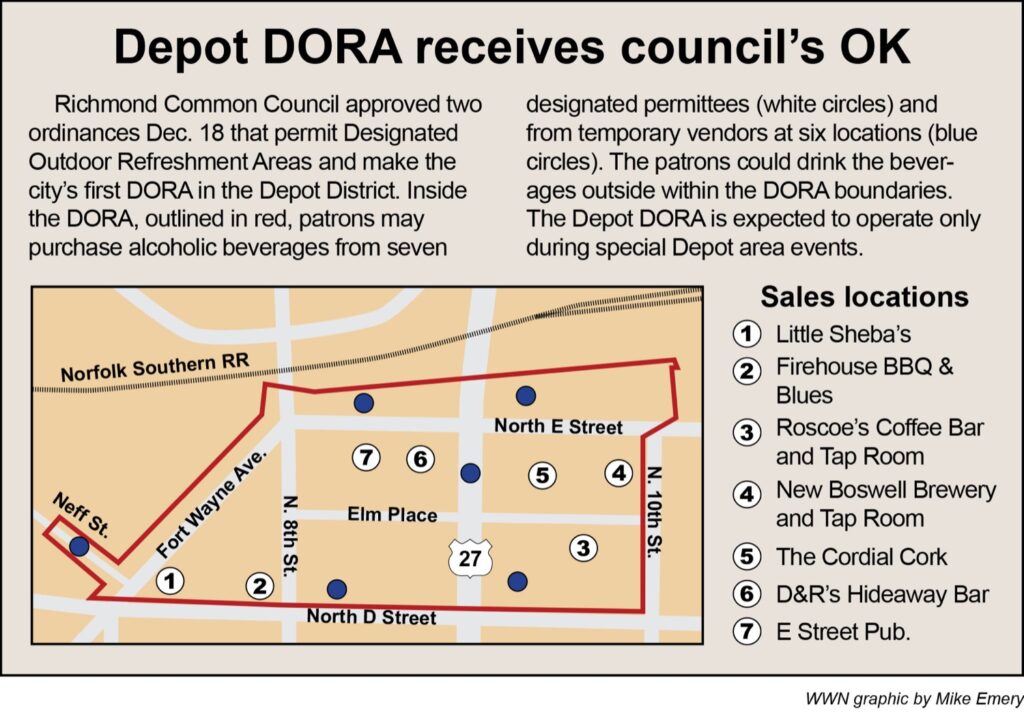The Depot District is Richmond’s first Designated Outdoor Refreshment Area.
Richmond Common Council passed two DORA ordinances with 6-3 votes Dec. 18. The first allows the city to establish up to the state maximum seven DORAs, and the second created the Depot DORA.
A new state law permits cities to establish areas exempt from certain open container laws. Patrons of specified vendors may purchase two alcoholic beverages in specially marked containers that may be consumed outdoors or inside other buildings within the DORA boundaries.
Council first received the DORA ordinances Sept. 5 and referred them to its safety committee. The committee worked with the Depot District Association and Richmond Police Department to amend the primary ordinance. Council also has the option to end DORAs if the Depot experience does not go well.
DORA-marked bottles and cups now must also identify the specific vendor from which the drink was purchased. In addition to meeting all public health and safety requirements, vendors must comply with all criminal code provisions, and if a vendor does not comply, the city may proceed with procedures to revoke the vendor’s permit. RPD is also permitted to track data and offer recommendations about violation patterns.

RPD Chief Mike Britt said the amendments alleviate his safety concerns and provide the police department a voice if problems arise. He said officers would respond to individual incidents rather than being assigned to a DORA event, depending on the event’s size.
“I don’t see it as being a constant draw on our resources,” Britt said. “We have no intention of babysitting these occasions.”
Council President Jeff Cappa said he contacted police departments in other communities with DORAs and did not receive any negative comments.
Council member Doug Goss said the process was the ideal collaboration and example of how the city process should work. The Depot’s association presented the DORA idea and worked with council and the police department to address concerns shared by all, including the Depot representatives.
Council member Lucinda Wright said she was excited about the DORA possibility. She cited positive experiences such as Beale Street in Memphis, Tennessee, and Bourbon Street in New Orleans.
“I commend you all on all of the research and the thought and the collaborations that you have put into this,” Wright said.
The Depot DORA is bounded by North 10th Street on the east, behind the buildings north of North E Street on the north, Fort Wayne Avenue and Neff Street on the west and North D Street on the south. Signage will identify when people are entering or leaving the DORA area. Drink sizes for beer, wine and mixed drinks are limited.
Adam Melton of the Cordial Cork and the Depot association said the DORA would enhance Depot events. He said that during wine tasting events, patrons sometimes chug their wine before heading to the next participating business. Melton also said that vendors participating in Oktoberfest ask for locations near the beer garden. A DORA would increase vendor exposure and sales by freeing customers to walk with their drinks.
Participating businesses, Melton said, will follow regulations, because they can’t afford to lose their liquor licenses.
“As a business owner, that license is everything to my business,” he said. “I would never do anything to compromise that and have that taken away.”
The ordinance permits the Depot DORA to operate every Thursday, Friday and Saturday evening, but Tracy Robinson of the Depot association said the plan is to use the DORA designation only during special events. She cited the spring wine walk, summer first Fridays, the fall Oktoberfest and the Christmas festival as likely DORA events from 4 to 10 p.m.
David Carpenter, who ran for mayor during the 2023 election, opposed both DORA ordinances. His research showed intoxication and drunk driving could result from a DORA. Carpenter also expressed concern about police officers and other personnel needed to oversee DORA activities.
Council member Jane Bumbalough voted against both ordinances. She volunteers at Cross Road Christian Recovery Center where women receive treatment for drug and alcohol abuse and has family members who are recovering alcoholics. Bumbalough said her votes were “due to conscience.”
Jeff Locke and Larry Parker also voted against both ordinances.
A version of this article appeared in the January 3 2024 print edition of the Western Wayne News.
